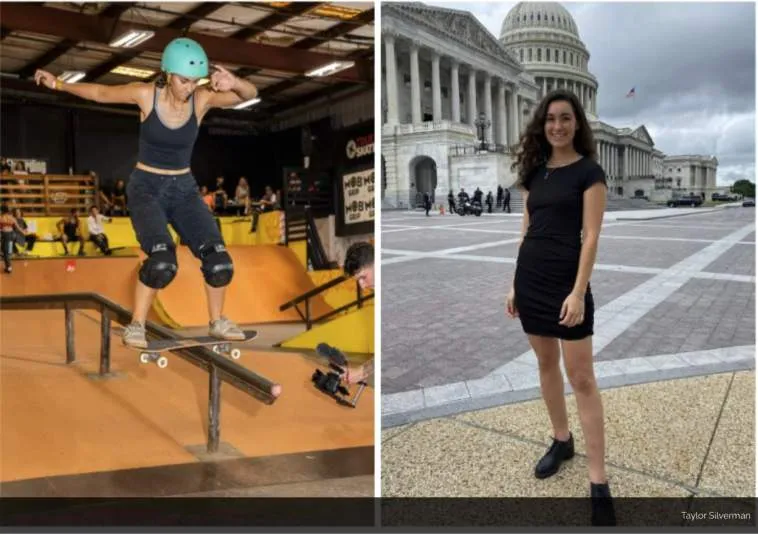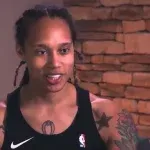(Washington Free Beacon) Taylor Silverman is grateful for all the anti-Semitic Instagram comments.
The 27-year-old amateur skateboarder made waves earlier this year when she spoke out against biological men participating in women’s sports. A self-described Zionist who is rarely photographed without a Star of David necklace, Silverman wasn’t surprised that online backlash quickly turned anti-Semitic. But she’s a little surprised by how much of it came from her friends.
“If I hadn’t spoken up, I would still be friends with people who are blatantly, and proudly, anti-Semitic,” Silverman tells the Washington Free Beacon. “I’m grateful I did, because it showed which of my old friends are anti-Semitic pieces of trash.”
The friendly fire was only part of the backlash Silverman faced for speaking publicly about her experience competing against transgender athletes. It wasn’t a political protest. Silverman had been skating for a decade, and only just began to feel that the skateboarding community was making space for women. But as soon as the community began to take shape, she felt it come under attack.
“The first time I lost to a trans man, I thought people would recognize it was unfair and speak out. The second time, I thought, ‘Someone has got to do something about this!’ The third time, I realized: I am somebody. And so, I spoke up.”
In a May 11 Instagram post, Silverman recounted losing first place in the 2021 Red Bull Cornerstone Contest to Lillian Gallagher, only the latest instance where she had gone up against transgender competitors.
“I am sick of being bullied into silence,” Silverman wrote in the post, which also included a screenshot of a concerned email she sent to Red Bull. “A biological man with a clear advantage won the women’s division,” Silverman wrote to Red Bull sports marketing manager Erich Drummer. “This took away the opportunity that was meant for women to place and earn money.”
Red Bull never responded to her email. But the trolls did.
“This argument is transphobic as fuck and shows what type of person you are,” one commenter wrote. “Hopefully you give up on life soon since you’re bad at everything,” added another.
Soon, the hateful comments began popping up on Silverman’s other posts.
“Taylor the type of girl to rat someone out at the camps just to get some extra bread,” reads one comment on a photo of Silverman at the Dead Sea, an apparent reference to the Holocaust. “It’s chill I can say this too I’m an actual Jew not some token ass white girl,” the commenter added.
Silverman’s Instagram feed is an object lesson in what happens to those who take the unpopular position on hot-button issues. The comments beneath her photos are a minefield of the left’s choice insults: “transphobe” and “TERF,” “colonist” and “Free Palestine!” As Silverman sees it, most of the vitriol comes from the same place.
“It’s anti-Semitism and misogyny disguised as some kind of social justice,” she says. “They’re just going with the latest trendy word to get away with hateful shit.”
Silverman is no stranger to being attacked for her faith. The anti-Semitism she faced in the classroom was one of the things that motivated her to complete high school at home. During the pandemic, she left her skating team after teammates sent her videos of Hitler and told her Jews “deserved” anti-Semitism. Going solo meant losing out on free gear and help with travel and competition expenses. But that hasn’t slowed her down one bit.
In fact, Silverman travels so much these days that she never knows what to say when people ask her where she lives. But whenever she can, she gets back to her hometown of Kalamazoo, Mich. It was there, as a newly minted, 16-year-old homeschool kid who missed playing sports, that Silverman first picked up a skateboard. It’s where she learned to ollie, and where she entered her first skating competition.
It’s also where she learned firsthand that the skating community isn’t always the safest place for young women. As a novice, Silverman says she “was treated horrifically” by male skaters and “faced everything from bullying to sexual assault at the skatepark.” When she first started entering local competitions, they often didn’t have separate contests for women. It was only after she started winning, and traveling to bigger events around the country, that she began to meet and befriend other female skaters.
“It was exciting to me when there were women’s divisions, and girls were showing up,” Silverman says, recalling the excitement she felt at the chance to “meet and hang out with women who were passionate about the same things as me.”






